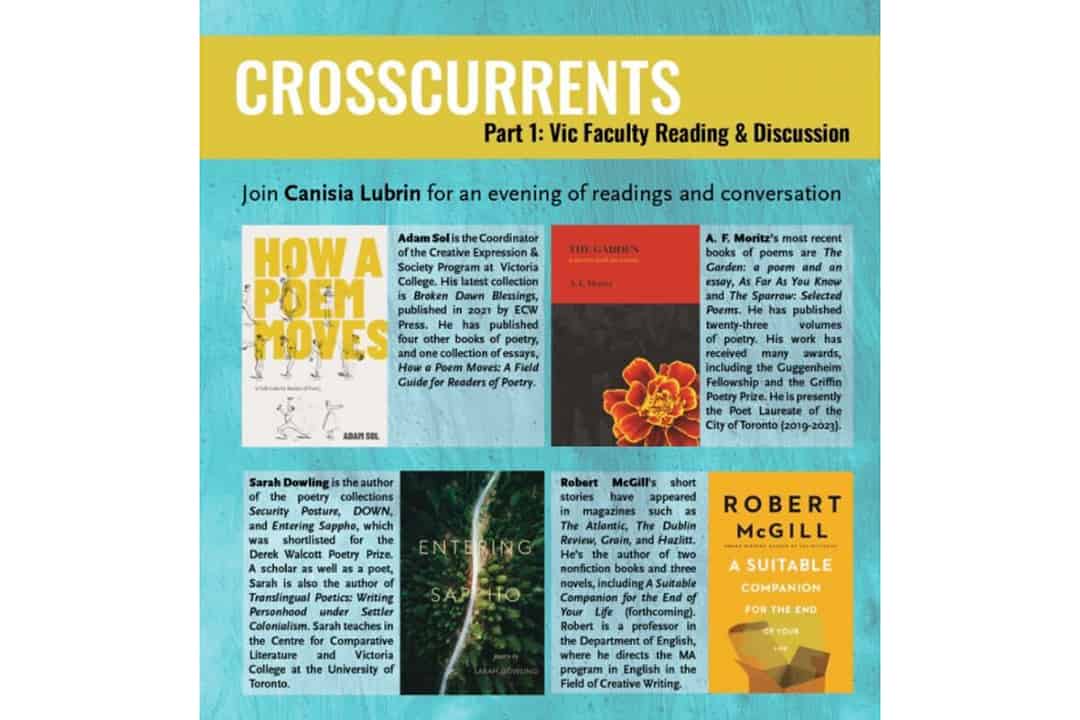Content warning: This article mentions a case of police brutality.
On March 15, four members of Victoria College’s faculty read their creative writing to an audience of their colleagues, students, and readers.
The event, hosted by poet and teacher Canisia Lubrin, centered around the theme of creative citizenship. Lubrin noted that, to her, the term’s meaning was still in the process of unfolding and developing. The host introduced the event as a symposium through which creative citizenship could be collaboratively discussed.
The event began with a reading from Albert Moritz, Goldring Professor of the Arts and Society. Moritz, also the current Poet Laureate of the City of Toronto, delivered a passage from The Garden, a collection of poetry that he published in 2021. Moritz’s website describes the collection as a “denunciation of injustice, especially as seen in the violent injustice directed to the African diaspora in North America.”
One of the poems that Moritz read was “The Garden in the Midst: Los Angeles, 29 April to 5 May 1992.” The poem’s title references the uprisings that took place in Los Angeles in 1992, after police officers were recorded beating Rodney King, a Black man. The officers were later acquitted.
While reading his work, Moritz spoke with a force that made me a hushed witness to his work. His excerpt was affecting, devastating, and it was followed by a long silence after its reading was finished.
Following Moritz, English Professor Robert McGill read his essay, “Night Enough,” which he wrote after leading a workshop in creative writing. Before the reading, McGill told the audience that “leading a workshop always has me thinking very much about creative citizenship.”
In his reading, McGill evoked the feelings of insularity that I think writing often involves. Following the reading, he highlighted the need to find delight in the strangeness of the writings of others. McGill concluded by saying that “even the nocturnal creatures have a better shot at things when there’s someone in their dark corner.”
Next, Coordinator of Creative Expression & Society Program Adam Sol read two poems from his book Broken Dawn Blessings. Sol described his work as “trying to dance a line between what’s public and what’s private, and how those things intersect and don’t always sit so comfortably together.”
One of Sol’s poems, “Manifesto,” was written as a call to revolt for a “next cohort” ushering a “new era of idealism.” Sol delivered his reading with a spirit that mirrored the language of his work. It was rousing — and poignantly brutal. Following the reading, Lubrin encapsulated my response to the reading when she described Sol’s poetry as “searing.”
After Sol’s reading, Professor Sarah Dowling read two excerpts from their work, Entering Sappho. Dowling described the first excerpt, “Clip,” as “short lyric poems that are made of some newspaper clippings.”
Dowling’s verse captivated my attention with ease. Their writing created a scene and destroyed it right after. The repetition in their poem punched me in the gut in a beautiful way. I found the words of Dowling’s last poem, “Entering Sappho,” to evoke emotion especially well: “now our hair is down. / The grass is wet. The grass grows / back. All we have is this thicker becoming, all / we are is this tangled perhaps.”
After Dowling’s reading, Lubrin used the poet’s notion of a “tangled perhaps” to start a discussion of creative citizenship with the event’s authors. The writers emphasized that creative citizenship involves a cultivation of community.
Dowling expanded on the notion of community by noting that writing is worthwhile if “[it is] accountable to some bigger group of people; it needs to be part of a conversation.” Sol added that creative citizenship does not just involve spending time with others, but committing to sharing their stories: “It has to be speaking to people… and in communication with the past and hopefully the future.”
Another topic that the speakers discussed was encountering poetry without thinking about the way we interpret it. Moritz described poetry as “simple and instinctual.” He elaborated, saying, “Everyone is a poet… poetry is the easiest thing, the most complex kinds of creativity flower out of people.”
The guests also considered the role of citizenship amid COVID-19. McGill noted that the pandemic has “shone a light on the precarious relationship to creative engagements that many people have.” He added that literary events must take into account accessibility to be successful.
McGill also praised the online platform of the event, noting that some people who want to attend in-person events “don’t have good health to get out the door… can’t afford the transit to get to the event, [or] can’t hear what’s being said [without live transcriptions].”
To conclude the discussion, Dowling challenged the audience to question their own definitions of citizenship. They explained, “Sometimes we have a particular citizenship that we don’t even want… sometimes we live in a place where we’re not a citizen at all.”
Moving forward, Dowling suggested that we should instead use words such as “belonging” or “witnessing,” noting that these terms are more “inclusive” when describing the acts of reading, listening, and being with each other.


